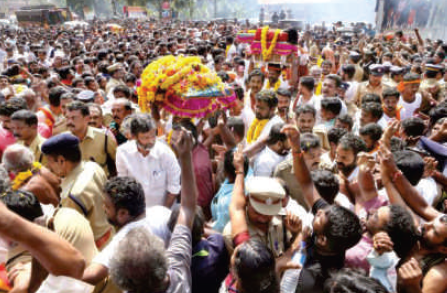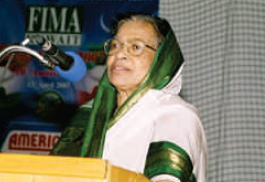Justice M. Fathima Beevi
This is a collection of articles archived for the excellence of their content. Readers will be able to edit existing articles and post new articles directly |
Contents |
Honourable Justice M. Fathima Beevi
By Dr. Vinita Kaul Gardner
Former Governor Of Tamilnadu
India Harmony Volume - 2 : Issue - 1, 2013
Grafted with perfect political panache on to the forefront of the impressive political arena of Tamil Nadu – Justice M. Fathima Beevi – with her royal antecedents from “God's Own Land” or neighbouring Kerala, stood poised on the threshold of a significant appointment in her illustrious career!
Early life and education
Born to Meera Sahib and Khadeeja Bibi on the 30th of April, 1927 at charming Pathananthitta in Kerala, she completed her schooling at the Catholicate High School in Pathanamthitta itself, but went further afield to acquire her Degree in Bachelor of Science from the prestigious University College in the picturesque city of Trivandrum, the capital city of the state! Even at that young age, she had made up her mind firmly about the future course of her career and, in due course, successfully obtained her Bachelor of Law Degree, from the Government Law College, also in Trivandrum.
Family
She hails from a royal line of ancestors . Fathima Beevi went on to acquire greater qualifications with proverbial determination and grit!
Career
Obtaining her crucial Bachelor of Law Degree from the Law College, Trivandrum, she was enrolled as Advocate on 14.11.1950 and appointed as Munsiff in the Kerala Sub-ordinate Judicial Services in May, 1958.
The career graph of this intrepid and enterprising lady steadily climbed up the ladder of success as she was first promoted as the Sub-ordinate Judge in 1968 and as the Chief Judicial Magistrate in 1972; other well-deserved promotions saw her occupy the seat of District & Sessions Judge in 1974 and appointment as the Judicial Member of the Income Tax Appellate Tribunal in January, 1980. Elevated to the High Court as a Judge on 4th August.1983, she became a permanent Judge of the High Court after a period of just seven month, in 1984.. While she retired as the Judge of the High Court after a period of four years, shortly afterwards, on the 6th of October,1989 to be precise, she received the coveted and highly prestigious appointment and elevation as a Judge to the Supreme Court! A rare honor indeed and a position which she held with distinction until 29th April, 1992 when she retired.
But that is a tale of contemporary times! Let us travel back in time, down the ages and trace the royal lineage of this right “royal” lady, to its traditional and ancient roots in captivating Kerala, with as many multi-dimensional cultural flavours, as the pungent and aromatic spices it traded with distant lands.....
1997: Governor of Tamil Nadu
The year was 1997 and the prestigious appointment that this formidable and former judge of the Supreme Court was slated to take over, was none other than that of the Governor of the splendid southern state of Tamil Nadu!
“Tamil Nadu”, which literally translates into “Tamil Country”, lies in the southernmost part of the Indian Peninsula and is bordered by the Union territory of Puducherry, and the states of Kerala, Karnataka, and Andhra Pradesh. Bound by the Eastern Ghats in the north, the Nilgiri, the Anamalai Hills, and Kerala on the west, by the Bay of Bengal in the east, the Gulf of Mannar, the Palk Strait in the south east, and by the Indian Ocean in the south, these geographical contours themselves are indication enough of the impressive area which would be under her command and control!
The Honorable Justice M.Fathima Beevi was appointed to the highest office in the State of Tamil Nadu in 1997 – as Governor of this splendid southern state – a position which she occupied till the year 2001. Administering the oath of Office to her as Governor of Tamil Nadu on 25 January 1997 and Justice Sukhdev Singh Kang, former Chief Justice of Jammu and Kashmir high court, as Governor of Kerala, the then President of India, Shankar Dayal Sharma said "Their experience of and insights into the working of the Constitution and the laws comprise valuable assets."
She also served as the Chancellor of Tamil Nadu University during her tenure as Governor and was the recepient of the Hon. D Litt and Mahila Shiromani Award in 1990. Also awarded Bharat Jyoti Award, life had come full circle! For the erudite Justice M. Fathima Beevi and illustrious daughter of the Pandalam royal lineage, had fulfilled her destiny and upheld the ancient legacy of poets, painters, sculptors and musicians, by emerging as a shining star in her own right on the firmament of Indian culture and politics!
'Firsts'
But first, to acquaint ourselves with some of the important “firsts” in this remarkable lady's life and career, Justice M. Fathima Beevi, as she is popularly known, is the first female judge to be appointed to the Supreme Court of India (1989) and the first Muslim woman to be appointed to any higher judiciary! Not only that but she also has the unique distinction of being the first woman judge of a Supreme Court of a nation in India and Asia!!
And so it was that upon her retirement from the court, she first served as a member of the National Human Rights Commission, before she was appointed as Governor of Tamil Nadu and occupied this important office from 1997-2001, a period of four years.
The Royal family of Pandalam
Fathima Beevi has the distinction of belonging to the Royal family of Pandalam in Kerala. pursuit of scholarship has been an article of faith with the members of the Pandalam royal family and many have distinguished themselves as poets, play-wrights, artists, astrologers and even Sanskrit scholars and teachers have adorned the annals of the family, It may be noted that Pandalam in Kerala is the chosen and blessed place where Lord Ayyappa, the presiding deity of Sabarimala had experienced his human sojourn as the son of the Raja of Pandalam! To this day, devotees in large numbers come to Pandalam to obtain the blessings of the Muslim Raja who offers them 'vibhuthy'!
The Pandalam family is an off-shoot of the Pandya kings of Madurai who, according to Sage Agasthya's 'Halasya Puranam', were the direct descendants of Lord Siva and Madurai Meenakshi. Considered thus to be Saivites, the members of the family follow the practice of blessing the devotees by giving them 'vibhuthy' or the sacred ash. A member of the Royal family also stays in Pampa during the pilgrimage season to offer blessings and 'vibhuthy' to the ayyappas.
Just for the record, the seeds for the genesis of the Pandalam kingdom were sown in 903 A.D. by the Pandalam Royal family. Having to flee westwards from Madurai due to personal life threats, briefly staying at various places acquired by purchase, by the time all members of the family reached Pandalam and a full-fledged kingdom was established, it was 1194 A.D! The territories under the Pandalam administration extended to over 1,000 square miles mainly eastward and covered the mountain ranges, consisting of 18 holy hills including Sabarimala.
According to the Travancore State Manual, the Rajas of Pandalam " were always friendly to the Kings of Travancore”, who had helped them in establishing their kingdom. Secularism was and is one of the guiding principles of the Pandalam family and there was peaceful co-existence of various religious groups. To this day there are many examples of the Pandale Raja of Pandalam being treated as the father of Lord Ayyappa of Sabarimala and the founder of the temple .The present Valiya koikkal temple at Pandalam was the private place of worship for the members of the Royal family. The Pandalam Rajas were known to extend lavish help in constructing churches and mosques in their territory.
Against this backdrop of an impressive cultural, religious and secular scenario, it is no wonder then that the Pandalam Royal family produced its own modern icon – Justice M. Fathima Beevi - of an illustrious personality, who brought laurels to the royal community, the prosperous “Paradise” of her native state, Kerala, and in fact, the entire country, by attaining a position of such eminence!







